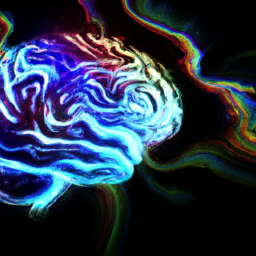Have you ever thought about why we dream? As someone with a strong interest in the world of dreams, I have spent countless hours delving into this topic.
One of the most intriguing aspects of dreaming is the role that chemicals play in the process. From neurotransmitters to hormones, there are a variety of substances that impact our dreams in different ways.
In this article, I will explore the science behind dreaming and the chemicals that influence our dream experiences. We will delve into the different types of neurotransmitters and hormones that affect our dreams, as well as the importance of sleep cycles and external factors.
By the end of this article, you will have a better understanding of what causes dreams and how they can impact our lives. So, sit back, relax, and let’s explore the fascinating world of dreaming together.
Key Takeaways
- Serotonin, acetylcholine, melatonin, estrogen, progesterone, and testosterone are chemicals and hormones that can affect dreaming.
- Sleep cycles, particularly the REM stage, are crucial for emotional and cognitive restoration during dreaming.
- Dreams have various purposes and benefits, including consolidating and storing information, prioritizing important details, and enhancing creativity and mental and emotional health.
- Advancements in brain imaging technology offer potential opportunities for developing targeted treatments for sleep and dream disorders.
The Science of Dreaming
Do you ever wonder what’s happening in your brain when you’re dreaming? Well, let’s talk about the science of dreaming.
Scientists have been studying dreams for centuries, but it wasn’t until the invention of the electroencephalogram (EEG) that they were able to measure brain activity during sleep. The EEG records the electrical activity of the brain, and it’s through this technology that we’ve gained a better understanding of what happens in our brains when we dream.
During sleep, our brains go through several different stages of activity. The first stage is when we’re drifting off to sleep, and our brain waves slow down. The next stage is when we’re in a light sleep, and our brain waves become even slower. The third stage is when we’re in a deep sleep, and our brain waves are at their slowest.
Finally, we enter the REM (Rapid Eye Movement) stage, which is when we dream. In the next section, we’ll explore the role of neurotransmitters in this process.
The Role of Neurotransmitters
As I sleep, my brain releases neurotransmitters that play a crucial role in the creation and content of my dreams. One such neurotransmitter is serotonin, which is responsible for regulating my mood and emotions. When levels of serotonin drop during sleep, my brain may produce dreams that reflect negative emotions such as sadness or fear.
On the other hand, when serotonin levels are high, my dreams may be more positive and uplifting. Another neurotransmitter that affects my dreams is acetylcholine. This chemical is involved in memory formation and helps to create vivid and detailed dreams. When acetylcholine levels are high, my dreams may be more realistic and memorable.
As I transition into the subsequent section about the impact of hormones, it’s important to note that hormones also play a significant role in shaping my dreams.
The Impact of Hormones
When I sleep, my body’s hormones can greatly influence the content of my dreams. Here are three ways in which hormones can impact my dream world:
-
Melatonin: Known as the ‘sleep hormone,’ melatonin is responsible for regulating my sleep-wake cycle. When my body produces more melatonin, I’m more likely to have vivid and intense dreams during the REM (rapid eye movement) stage of sleep.
-
Estrogen and progesterone: These female sex hormones can also influence my dreams. During the menstrual cycle, for example, a rise in progesterone can cause me to have more anxiety-driven dreams.
-
Testosterone: Men tend to have more aggressive dreams due to the presence of testosterone in their bodies. This hormone can also lead to more sexual dreams.
Understanding the impact of hormones on my dreams is just one aspect of the complex world of sleep. Moving forward, it’s important to look at the bigger picture and consider the importance of sleep cycles in shaping my overall sleep experience.
The Importance of Sleep Cycles
You may not realize it, but the way your body moves through different sleep cycles is crucial for feeling rested and rejuvenated in the morning.
During the night, our bodies go through several stages of sleep, each with its unique characteristics and functions. The first stage is the transition from wakefulness to sleep, and we typically spend about five minutes in this stage. The second stage is the light sleep stage, where our heart rate and body temperature decrease. This stage lasts about 50% of our total sleep time.
The third stage is the deep sleep stage, which is essential for physical restoration and repair. Lastly, the REM (Rapid Eye Movement) stage is where most of our dreaming occurs, and it is crucial for emotional and cognitive restoration.
Understanding these sleep cycles and getting enough of each stage is critical for feeling refreshed and alert when you wake up. If you cut your sleep short, you may not get enough deep sleep or REM sleep, leaving you groggy and tired in the morning.
However, several factors can influence the quality and quantity of our sleep, including external factors such as stress, noise, and light exposure. These factors can disrupt our sleep cycles and prevent us from getting the restorative sleep we need.
The Influence of External Factors
Now let’s talk about how external factors like stress and noise can impact the quality of your sleep. When we’re exposed to stressful situations or loud noises, our bodies release cortisol, a stress hormone that can interfere with our ability to fall asleep and stay asleep. This can lead to fragmented sleep and a decrease in the amount of time we spend in deep, restorative sleep.
Furthermore, external factors can also influence the content of our dreams. For example, if you fall asleep while watching a horror movie, you may have nightmares or anxiety-provoking dreams. On the other hand, if you fall asleep listening to calming music or sounds, you may have more peaceful and pleasant dreams.
The connection to memory also plays a role in the content of our dreams, but we’ll delve into that in the next section.
The Connection to Memory
Imagine your brain as a library, with each dream serving as a carefully archived memory waiting to be revisited. Dreams are believed to be an essential part of the memory consolidation process, where the brain sorts and stores information from the day. It’s like a processing unit that takes all the events and emotions of the day and compiles them into a narrative that we experience as a dream.
This mechanism helps us to remember and prioritize important information, as well as to forget irrelevant details. Here are some key takeaways about the connection between dreams and memory:
- Dreams help the brain consolidate and store information from the day.
- They prioritize important information and discard irrelevant details.
- Dreams can help us remember things better by replaying them in a meaningful way.
- They also serve as a way to forget and let go of unnecessary information or emotions.
As dreams play a crucial role in memory consolidation, it’s no surprise that they’re also linked to our emotions.
The Relationship to Emotions
Feeling a rollercoaster of emotions during a dream is like being on a wild ride through a colorful and vivid world. Dreams have the power to transport us to different emotional states, from the highest highs to the lowest lows. It’s amazing how a chemical in our brain can create such a complex world within our minds.
To illustrate the power of emotions in dreams, imagine a table with three columns and four rows. In the first column, there is a picture of a person smiling and laughing with friends. In the second column, the picture shows the same person crying and alone. In the third column, the person is seen screaming in terror. As you move down the rows, the background of the pictures changes from a sunny beach to a dark alleyway to a haunted house. This table represents the emotional journey that we can experience in our dreams, from happy moments with loved ones to terrifying nightmares.
The emotions we feel in our dreams are often linked to our subconscious thoughts and feelings. They can be a reflection of our current emotional state or a way for our minds to process past traumas. Understanding the relationship between dreams and emotions can provide valuable insight into our inner selves. Moving forward, let’s explore how we interpret these emotions and what they can tell us about ourselves.
The Interpretation of Dreams
I find it fascinating how our dreams can reveal so much about our subconscious mind. In this subtopic, I’ll be discussing three key points: common themes in dreams, dream analysis, and interpretation.
By exploring these topics, we can gain a deeper understanding of ourselves and our innermost thoughts and feelings.
Common themes in dreams
Typical dream themes include falling, being chased, and flying. These dreams are often unsettling and can leave us feeling confused upon waking up. However, they are also quite common and have been studied extensively by psychologists and neuroscientists.
To help understand the common themes in dreams, here is a table of some of the most recurring dreams and their potential meanings:
| Dream Theme | Potential Meaning |
|---|---|
| Falling | Fear of failure or loss of control |
| Being chased | Anxiety or feeling pursued by a problem |
| Flying | Freedom or a desire for escape |
| Teeth falling out | Insecurity or a fear of aging |
| Being naked in public | Vulnerability or fear of judgment |
| Being late | Fear of missing out or being unprepared |
While these themes may seem random or nonsensical, they can often be linked to our subconscious fears and desires. Recognizing and interpreting these dreams can offer insights into our inner thoughts and emotions. In the next section, we will explore the process of dream analysis and interpretation.
Dream analysis and interpretation
Exploring the interpretation of your dreams can provide valuable insight into your subconscious mind and shed light on hidden desires or fears. Some experts believe that dream analysis can be a helpful tool for personal growth.
Dream analysis involves looking at the symbols, themes, and emotions present in your dreams and interpreting them based on your personal experiences and associations. For example, dreaming of flying may represent a desire for freedom or a sense of empowerment. On the other hand, dreaming of falling may indicate a fear of failure or loss of control.
By understanding the meanings behind your dreams, you can gain a better understanding of yourself and your emotions. This can lead to increased self-awareness and help you make positive changes in your life.
Additionally, some research suggests that dreaming can have cognitive benefits such as improving memory consolidation and problem-solving abilities. Understanding the significance of your dreams can help you harness the power of your subconscious mind and reap the benefits of dreaming.
The Benefits of Dreaming
You can’t deny the euphoric feeling of waking up from a dream, feeling refreshed and energized. It’s just one of the many benefits of dreaming. Dreaming offers a variety of advantages that contribute to our overall well-being. Here are some of the benefits that I’ve personally experienced:
- Enhances creativity and problem-solving skills.
- Helps process and cope with emotions.
- Improves memory consolidation and learning.
- Provides a source of inspiration and intuition.
- Promotes overall mental and emotional health.
Dreaming is an essential part of our lives, and it serves a crucial purpose in our mental and emotional well-being. As we continue to explore the science behind dreaming, we can discover even more ways to harness its power for our benefit.
Future Research Directions
As I reflect on the benefits of dreaming and the chemical that causes dreams, I’m excited to explore what the future of dream research holds.
Advancements in brain imaging technology have opened up new avenues for studying the brain during sleep and dreaming. This has the potential to lead to new treatments for sleep and dream disorders, improving the quality of life for those who suffer from these conditions.
Advancements in brain imaging technology
With brain imaging technology, I can now see the activity in different regions of my brain while I dream. This gives us a better understanding of the chemical processes involved in dreaming.
For example, some studies have shown that during rapid eye movement (REM) sleep, the amygdala and hippocampus – two regions of the brain involved in memory and emotion – become more active. This suggests that during REM sleep, the brain is consolidating memories and processing emotions.
Advancements in brain imaging technology have also allowed researchers to study the effects of different chemicals on the brain during sleep and dreaming. For example, studies have shown that a decrease in serotonin levels – a neurotransmitter involved in mood regulation – is associated with an increase in dreaming, particularly vivid and emotional dreams.
Understanding the chemical processes involved in dreaming could have potential for new treatments for sleep and dream disorders.
The potential for new treatments for sleep and dream disorders
Advancements in brain imaging technology offer a window into the workings of the brain during sleep and could pave the way for treatments that are as transformative as a ray of sunshine breaking through the clouds on a rainy day. With these advancements, we can now see the activity in various regions of the brain during sleep and identify specific patterns associated with different stages of sleep, including dreaming.
This new insight offers a potential opportunity to develop targeted treatments for sleep and dream disorders. For example, by targeting the regions of the brain responsible for generating dream content, we may be able to manipulate the content of dreams or even reduce the frequency and intensity of nightmares. The following table outlines some potential treatments that could be developed based on advancements in brain imaging technology:
| Treatment | Description | Potential benefits |
|---|---|---|
| Targeted dream manipulation | Using brain imaging to identify and manipulate the regions of the brain responsible for dream content | Reducing frequency and intensity of nightmares, improving sleep quality |
| Sleep stage targeting | Using brain imaging to identify the sleep stage a person is in, and then using targeted interventions to improve the quality of that stage | Improving overall sleep quality, reducing daytime sleepiness |
| Brain stimulation therapy | Using non-invasive brain stimulation techniques to target specific regions of the brain during sleep | Treating sleep disorders such as insomnia or sleep apnea |
Frequently Asked Questions
How can I control the content of my dreams?
I can control the content of my dreams by keeping a dream journal, practicing relaxation techniques before bed, and visualizing positive scenarios. It takes effort, but with practice, I can shape my dreams to my liking.
Can certain foods or drinks affect the occurrence of dreams?
"Hey, did you know that what you eat or drink can affect your dreams? Certain foods like spicy dishes or alcohol can lead to more vivid dreams. But as for controlling the content, that’s a different story." ‘Dreams are largely influenced by our subconscious thoughts and emotions, and cannot be fully controlled by external factors.’
Are there any ways to prevent nightmares?
I’ve found a few ways to prevent nightmares. I try to avoid watching scary movies before bed, and I make sure my sleeping environment is comfortable. Practicing relaxation techniques like deep breathing also helps.
Can dreaming be harmful to my mental health?
Dreaming can sometimes be harmful to my mental health. Nightmares can cause anxiety and sleep disturbances, leading to daytime fatigue and mood changes. It’s important to address any recurring nightmares with a healthcare professional for proper treatment and support.
Can dreaming help with problem-solving or creativity?
Dreaming can enhance problem-solving and creativity. In fact, studies show that 50% of Nobel Prize winners had a breakthrough idea while dreaming. So, next time you hit the sack, remember that your dreams could be your next big idea.
Conclusion
Overall, I’ve learned that dreams are a complex phenomenon influenced by various chemicals and external factors. Neurotransmitters such as serotonin and dopamine play a significant role in the creation and regulation of dreams, while hormones like cortisol and melatonin impact the frequency and intensity of our dream experiences.
Sleep cycles, external stimuli, emotions, and even our subconscious thoughts can all influence the content and meaning of our dreams. As the old adage goes, dreams are the window to our soul. They provide us with insight into our deepest desires, fears, and emotions. By interpreting our dreams, we can gain a better understanding of ourselves and our subconscious mind.
Additionally, dreaming has been found to have numerous benefits, including improving memory consolidation, boosting creativity, and reducing stress. As researchers continue to explore the science of dreaming, we may uncover even more fascinating insights into this mysterious and captivating aspect of human experience.










